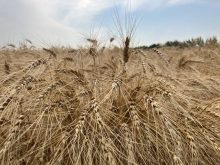Buying Agricore United led to a healthier bottom line for the former Saskatchewan Wheat Pool in its first year as Viterra, the company announced Friday.
Plus, the company now expects that its “synergies” from the merger, which became official in June, will pay off even better than it first predicted.
Having changed its fiscal year-end to Oct. 31, the merged company posted its year-end report Friday with five quarters’ worth of fiscal data, showing net earnings of $106.1 million on $3.88 billion in revenues for those 15 months.
For the 12 months ending Oct. 31, 2007, net earnings were $111.2 million on $3.54 billion in revenues, which the former Pool compared against its pre-merger 2006 earnings of just $3.05 million on $1.6 billion in revenues.
Read Also

Pea, lentil outlooks have some positive signals – Penner
As pulse growers consider what to plant this spring, Chuck Penner of Leftfield Commodities Research said there is some optimism in the Canadian pulse market. Penner gave a presentation at the Saskatchewan Pulse Growers meeting in Swift Current on Feb. 4.
During that first year, the company said, it found “synergies” of $9 million, up from its target of $6.2 million at the time of the merger. The company has now raised its gross synergy target from $92 million to $96 million, with $53 million coming from its grain handling segment, $14 million from agri-products and $29 million in its corporate segment.
That said, the total net costs incurred to make the merger happen are now projected at about $274 million, about $255 million of which has already been rung up. Those costs are being covered from cash flow and from Viterra’s $70 million sale of assets to Cargill to help satisfy antitrust regulators.
The company also applied $255 million from the sale of other assets toward long-term debt. It made $255 million selling elevators to James Richardson International (JRI), the owners of Pioneer Grain, and $84 million selling its North Shore terminal in Vancouver. That sale financed Viterra’s purchase of a 50 per cent stake in the Cascadia terminal, also at Vancouver.
Viterra also recorded a gain of $4.7 million on the sale of its shares in WCE Holdings, the parent company of the former Winnipeg Commodity Exchange, now sold and renamed ICE Futures Canada.
Margins
Grain handling margins improved during 2007, Viterra said, citing better inventory management, appreciation in the company’s open market grains (due to both market prices and crop quality) and efficiencies in its handling system.
Margins also improved in the agri-products segment across most of Viterra’s ag input product lines, particularly in fertilizer where prices increased on tighter supplies and higher commodity prices, while fertilizer manufacturing costs were down from 2006.
Viterra also noted Friday that in a show of optimism for the coming crop year, farmers have pre-paid the company for $250 million worth of seed and crop inputs before spring seeding. That’s about $100 million ahead of the company’s expectations for pre-payments, it noted.
In its news release Friday, Viterra’s CEO Mayo Schmidt said the effort by staff across all the company’s business segments has contributed to what it called “record performance” and supports “the launch of our strategy for continued growth.”
That means the company is on the lookout for acquisitions, Schmidt told reporters on the fifth-quarter conference call.
The Canadian Press news agency on Friday quoted Schmidt as saying the company is analyzing “many different opportunities” across each of its operating divisions, in both Canada and the U.S. as well as in areas “that we think fit seamlessly on an offshore basis.”














